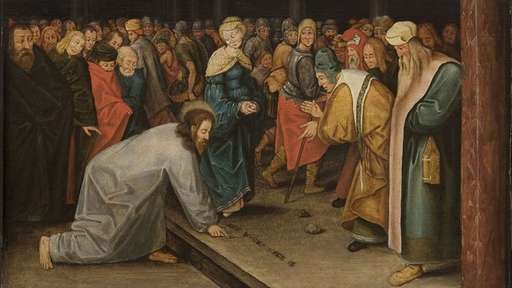On things lost and gained in translation – in Harper’s readings:
‘From an account of John 8:3–11 in a law-and-ethics textbook published by the Chinese Communist Party. In the Gospel, a group of Pharisees have gathered to stone a woman accused of adultery. Translated from the Chinese.
Once upon a time, Jesus spoke to an angry crowd that wanted to kill a guilty woman. “Of all of you, he who can say he has never done anything wrong can come forward and kill her.” After they heard this, the crowd stopped. When the crowd retreated, Jesus raised a stone and killed the woman, and said, “I am also a sinner, but if the law can only be executed by a spotless person, then the law will die.”’
Read it here.
Here’s another probably slightly more accurate translation:
‘The teachers of the law and the Pharisees brought in a woman caught in adultery. They made her stand before the group4and said to Jesus, “Teacher, this woman was caught in the act of adultery.5In the Law Moses commanded us to stone such women. Now what do you say?”6They were using this question as a trap, in order to have a basis for accusing him.
But Jesus bent down and started to write on the ground with his finger.7When they kept on questioning him, he straightened up and said to them, “Let any one of you who is without sin be the first to throw a stone at her.”8Again he stooped down and wrote on the ground.
9 At this, those who heard began to go away one at a time, the older ones first, until only Jesus was left, with the woman still standing there.10Jesus straightened up and asked her, “Woman, where are they? Has no one condemned you?”
11 “No one, sir,” she said.
“Then neither do I condemn you,” Jesus declared. “Go now and leave your life of sin.”’
Read it here.
And here’s King James:
‘
3 And the scribes and Pharisees brought unto him a woman taken in adultery; and when they had set her in the midst,
4 They say unto him, Master, this woman was taken in adultery, in the very act.
5 Now Moses in the law commanded us, that such should be stoned: but what sayest thou?
6 This they said, tempting him, that they might have to accuse him. But Jesus stooped down, and with his finger wrote on the ground, as though he heard them not.
7 So when they continued asking him, he lifted up himself, and said unto them, He that is without sin among you, let him first cast a stone at her.
8 And again he stooped down, and wrote on the ground.
9 And they which heard it, being convicted by their own conscience, went out one by one, beginning at the eldest, even unto the last: and Jesus was left alone, and the woman standing in the midst.
10 When Jesus had lifted up himself, and saw none but the woman, he said unto her, Woman, where are those thine accusers? hath no man condemned thee?
11 She said, No man, Lord. And Jesus said unto her, Neither do I condemn thee: go, and sin no more.’
Read it here.
The Chinese translation first reminded me a bit of Kafka.
‘If the law can only be executed by a spotless person, then the law will die.’
But it’s more appropriate to think of both Dostoevsky and Carl Schmitt.
The law must survive, even if that means that one sinner kills the other.
